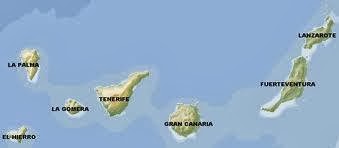The Land relief of the Iberian peninsula 2nd Part.
sábado, 1 de marzo de 2014
canary islands
there is a subtropical climate is due to its aproximity to the tropics, precipitation is very aparse, between 150 and 300 and even lower at desert areas, temperatures do not vary greatly, with warn winters around 17 degrees and hot summers characterized by hot, humid summers and generally mild to cool winters. Under the Köppen climate definition, this category of climate type covers a broad range of attributes, especially in terms of winter temperatures. The term "subtropical" may be a misnomer for locations along the cooler ranges.
mountain climate
is found in the mountains system of the penisula above an altitude of 1,000 metres, precipitation normally is high above 1,000 mm a year and temperatures are cold with low winter
vegetation includes:
tiers of forest
scrubland
meadows
mediterranean climate
region extends from the Andalusian Plain along the southern and eastern coasts up to the Pyrenees, on the seaward side of the mountain ranges that parallel the coast. Total rainfall in this region is lower than in the rest of Spain, and it is concentrated in the late autumn-winter period. Generally, rainfall is slight, often insufficient, irregular, and unreliable. Temperatures in the Mediterranean region usually are higher in both summer and winter, and diurnal temperature changes are more limited than those of the continental region. Temperatures in January normally average 10 to 13 C in most of the Mediterranean region, and they are 9 C colder in the north eastern coastal area near Barcelona
.
vegetation includes:
.
vegetation includes:
- evergreen forest
- cork tree
- garrigue
miércoles, 26 de febrero de 2014
Climates type and vegetation
Oceanic Climate
Vegetation
is
characterized by :
Oak and
beech trees

natural meadows :
Climates and vegetation
The climates and vegetation
Spain is
located in the temperate zone, but there are different climates because of the
influence of these factors
Latitude:
These means
that the temperature increase when you travel to the south
Altitude:
Causes temperatures
to fall and precipitations to rise
Distance to the sea:
These means
in the coast temperatures are milder and increases temperature in the interior
of the peninsula
2nd part
The Balearic Islands ...
it is a Spanish archipelago situated In the West of the Mediterranean Sea, around 100km off the coast of mainland Spain. It consists mainly of Majorca, Minorca, Ibiza, Formentera and Cabrera islands, where you can find the most stunning Spanish beaches and turquoise waters of the Mediterranean, as well as grand sights. The islands are so diverse that even though they are so close to each other, each of them has its own unique character.
 |
| Añadir leyenda |
The land relief of the archipelagos
The Balearic Islands, found in the Mediterranean Sea, is made up of 4 large islands (Majorca, Ibiza, Formentera and Menorca) and around 144 smaller islets
◦Majorca, Ibiza and Formentera are an extension of the Baetic mountain ranges from the Spanish mainland
◦Menorca is a continuation of the Catalan coastal mountain range
We can distinguish three different landscape zones on the island of Mallorca
◦The Tramuntana Range
◦Contains the hightes summit, Puig Major
◦The Llevante Range
m (es Pla)
◦A plain between the
The coasts vary by island
◦cliffs are found in the north of Mallorca and Menorca
◦sandy beaches with small coves
Canary Islands
The Canary Islands are found in the Atlantic Ocean, near Africa
◦Composed of 7 main islands (La Palma, El Hierro, La Gomera, Tenerife, Gran Canaria, Fuerteventura and Lanzarote) as well as some smaller islands
The Canary Islands are volcanic in origen:
◦Created from fractures in the bottom of the Atlantic Ocean
◦created different volcanic forms
◦ash cones
◦lava needles
Suscribirse a:
Comentarios (Atom)
.jpg)
















